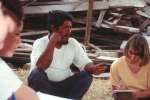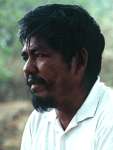|
|
||||
| Prev |
Guatemala 2000 A photo journal by David Booth |
Next | ||
|
|
||||
|
|
||||
| Prev |
Guatemala 2000 A photo journal by David Booth |
Next | ||
|
|
||||
In the afternoon we met with Don Nicolas, Vice President of the Farmers' Cooperative in Nuevo Mexico, to hear about his experiences as a refugee, escaping to the jungle as his village was destroyed, living in a refugee camp in Mexico, and finally returning to Guatemala. (He also happened to be the father of our host family.)

Don Nicolas, 50, Vice President of the Farmers' Cooperative, describes his as a refugee. |
I was originally from the South of Guatemala. In the 60s, I decided to go to the Quiche area. I arrived to a small community with only seven houses, but life there was wonderful. Between 1965 and 1967, through the help of a priest named Aduardo, more families arrived and five cooperatives were formed with the main objective of keeping the people united. After Aduardo died, another priest named Guillermo Woods, an American, came in his place. He was killed by the military. This was the first act of violence committed by the military in this area.
After that, the army arrived and stayed everywhere. In 1978 the massacres started and people began to disappear. Some people were taken in the middle of the night. Everybody feared, going to bed, that they would not wake up. At first we didn't know who was doing it or why. In the 80s, during the period of General Romeo Lucas Garcia, there were even more and more massacres, and entire villages were destroyed. It was only then that Don Nicolas and others realized that it was the army doing it, and not the guerrillas or robbers. Up to that point, they had actually trusted the army and the government.
This is a very painful time to remember. After the massacres, a decree was passed that laid out a defensive plan called tierra razada ("scorched land"), and the army was free to search all villages. During this time, many people were brutally murdered. The army tried to kill all the campesinos (peasant farmers) that were thought to help the guerrillas, but in the process houses were burned, crops destroyed, innocent women and children were killed for no reason. We knew that this decree was unjust and that the army was not getting any closer to stopping the guerrillas, but that didn’t seem to matter to the government or the army.
Most of the massacres were early in the morning; many people would manage to hide in the mountains, but those that couldn’t were captured. All the women were obliged to cook and wash clothes for the soldiers, who then raped them, and then burned them or killed them. I know this for a fact, because I found many of the corpses. Once I found a pregnant woman who was beaten to death with steel-toe boots, cut open and her fetus thrown away and replaced with the head of a campesino. Both corpses -- the woman’s and the campesino’s --were then crucified and a warning was left: "This is what will happen to anyone who does not collaborate with the army".
It was the massacre that took place in Quarto Arana that made me and others decide to flee to the jungle. There, we lived and ate like animals. We had no bread or shelter. We learned to eat roots that were so sour that they needed to be boiled over and over to be eaten. We lived in the jungle like this for nine years. Finally in 1983 we made our way through the jungle to Mexico: first, because the jungle could not sustain us anymore; second, because there was a need for a delegation living in Mexico to negotiate with the Guatemalan government; and third, because the army became more and more violent killing everybody that was in the jungle thinking that they were part of the guerrillas.
In order to get to Mexico, we had to cross the area of Quiche and its many rivers. Some would swim, some would walk tied together with ropes and with children on their shoulders. Many of them died in the process. Of the 1,000 that started out, only 400 made it to Mexico.

Don Nicolas. |
When the first group of Guatemalan refugees arrived in Chiapas, Mexico, they were not welcomed by the Mexicans. The Mexicans thought the refugees were invading. But the refugees screamed that they would rather die by Mexican hands than “their own” (meaning the hands of other Guatemalans), and fell to their knees. The Mexicans then took off their own clothes and gave them to the refugees, and then also fed them. Other groups arrived later and the diocese of San Cristobal helped them all. The Guatemalan government, unhappy with what was going on, asked the Mexican government to extradite the refugees, but after many negotiations, the refugees were allowed to stay and organize.
Our stay in Mexico was a learning experience. Not only did we learn how to organize, but we also learned a lot about women’s rights and their importance in society -- something that we had always ignored in Guatemala. Life in Mexico was actually better than here in Nuevo Mexico. There were streets, doctors, electricity, potable water and the land was better for growing corn. But we never forgot that our purpose in being in Mexico was that of creating a negotiating commission: COMAR. COMAR was able to participate in the national negotiations that led to the Peace Accords, and once the Accords were signed, I and others decided to return to Guatemala. After two months on the road, we finally arrived at Guatemala City, and later we came to what we called "Nuevo Mexico". It was hard then, and it is still now. We feel marginalized and a lot of services are missing, but there is a lot of pressure from all sides for us to succeed in staying here.
The hardest part is that although there is peace now, I have seen very little political change, and the only peace that I have seen is the one on paper. The government has also done very little for us since our return to Guatemala. All the promises were not kept, and all the changes have come from our own work. I wonder how it is possible that governments of other countries worry so much about their conditions, but not their own government, which is the only one with the obligation. Government representatives have come to Nuevo Mexico and I have gone to the capital to talk about possible solutions to improve life in the countryside, but nothing seems to ever come out of it, and I and the other campesinos know that it’s not a monetary problem, because a lot has been donated from other countries and international organizations, but nobody knows where that money actually goes.
Seventy-three children of the Nuevo Mexico community were born in Mexico, and they all want to return there, where life was better. Now, many of them have nothing: no houses, no education, no shoes, no clothes, no recreation. Their families were first victims of the war and now they are victims of all the injustices.
The foremost priority of Nuevo Mexico is to own some land, but all the government has done for us is telling us: “Go there, we will give you the title of the land, and you will have twenty years to pay us back nine million quetzals”. [About $1 million USD.] But how can it be? We owned land before the war, we were pushed off of it, and now we have nothing. We are not complaining that we cannot go back to our former land -- which is now inhabited by other poor people that have lost their own land too -- but why should we pay exorbitant amounts for something that is rightly ours? Our current proposal is to pay only half of the amount requested by the government, but that is still very hard since our only income is from the sale of coffee, coffee that we have to grow on a common lot instead of corn and other staple crops.
[End of meeting notes]